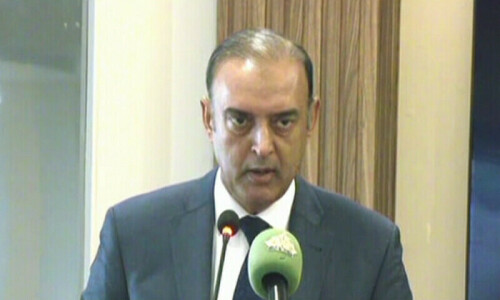CAIRO: Arab League member states are set to reconvene this weekend in the Tunisian capital Tunis for the summit called off at the last moment in late March by the host Tunisia.
However, while scores of diplomats, journalists and politicians have booked their hotels, some doubt remains whether the grand meeting of the 22 states will come off at all.
To ensure the summit will be a success this time round the league's foreign ministers met behind closed doors for two days of talks even before the official beginning of the summit.
They discussed the summit's final resolution down to the last detail, according to delegation sources, who point out that Tunisia and some Gulf states are determined to avoid anything in the statement that could irritate the US administration.
"We will have a fruitful summit," the Egyptian press quoted Egypt's foreign minister Ahmed Maher on Wednesday.
Indeed, every Arab state seems to have a different answer to the question how far they would yield to US demands and aims in the region.
While Syria, for instance, has called for a clear condemnation of the US occupation in Iraq, other Arab states favour a summit resolution praising the US-led coalition's planned transfer of power to the Iraqis on June 30.
The Arab leaders are further under pressure from their own people who expect a clear denouncement of US policies in the Middle East.
Such views have grown even stronger since US President George W. Bush's recently dismissed as unrealistic Palestinian demands for the dismantling of all Jewish settlements in the occupied West Bank and a right of return for Palestinians displaced in the wake of the 1948 proclamation of Israel.
Arab League Secretary-General Amre Mussa has also called for realism: "We are moving in stormy waters and have to steer the Arab ship - a rather small vessel - carefully to avoid distress at sea."
The cancellation of the last summit had also hallmarked his own personal failing to unite the bloc, many observers say.
A European diplomat this week warned not to expect too much from the new summit either: "It is nonsense to talk about the Arab League as if it was the European Union. The difference between the two organizations is that the league's resolutions are mostly not followed by action."
Arab diplomats say the host government might even cancel the summit a second time, if it considers differences in the participants' views irreconcilable.
But even if the meeting goes ahead, it will hardly end with groundbreaking resolutions, observers say. At best, it will result in a vague commitment to democratic reforms and the condemnation of Israeli military operations on the West Bank, observers say.
President Ali Abdullah Sakil from Yemen and King Hamad bin Issa el-Khalifa from Bahrain have announced that they will not even attend the summit.
Amre Mussa would already be happy if 15 out of 22 heads of states turned up in Tunis, according to observers.
And many Arabs who deplore that the Arab voice is barely heard in international politics these days have lost all trust to the League anyway.
A commentator of Cairo's Al-Ahram - a daily newspaper considered close to the Egyptian government - captured the frustration of many Arabs in a nutshell recently:
"The problem of the Arabs is that they meet to discuss what others want from them - but they have never met to discuss what they want themselves," he said. -dpa














































Dear visitor, the comments section is undergoing an overhaul and will return soon.